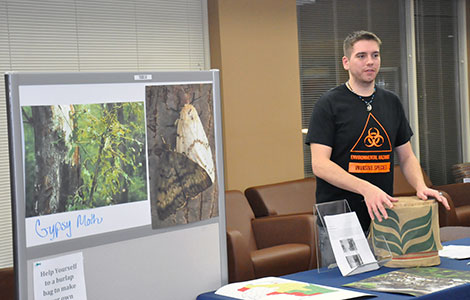Honors project examines invasive species

Phi Theta Kappa members presented their honors project on invasive species in the Truax Student Lounge.
December 10, 2014
The Phi Theta Kappa Honor Society Chapter presented their honor’s projects on invasive species on Dec. 3 in the Madison College student lounge. The students did a cost-benefit analysis of several invasive species that affect Wisconsin and gave demonstrations at interactive stations.
Phi Theta Kappa researched the impact of white nose syndrome fungus in bats, gypsy moth, emerald ash borer, garlic mustard and Eurasian milfoil. Each invasive species can cause severe problems for Wisconsin’s ecosystem and costs the government millions of dollars every year to remove infestation and repair damage.
“One bat can eat up to 60,000 mosquitos in a night,” said Bill Garrett. “Multiply that by millions of bats being wiped out. The mosquito population will explode along with other insects that they eat and that will make our lives miserable.”
Garrett said the impact on the bat population have detrimental effects on tourism and agriculture, costing around $650,000 a year. The costs of insect suppression in Wisconsin alone will be around $1.5 billion a year. Not to mention the thousands of extra mosquitoes that will plague backyard barbeques and hikes through the woods if there are fewer bats to eat them.
“When the emerald ash borer came over here it didn’t have the natural predators,” said Garrett. “The population exploded. The gypsy moths and emerald ash borers are wiping out whole states worth of forests. Hundreds of species of trees. Nothing is preying on them and they are breeding out of control.”
The World Wildlife Foundation says invasive species can be any kind of living organism that is not native to an ecosystem and causes it harm.
Take garlic mustard for example. The invasive species is one of the first to grow in the spring and grows so thick and tall that it chokes out any space for the other plants to grow. Therefore garlic mustard can take over the bottom layer of a forest and kill off other species of plants in the area, which can have devastating effects ecologically and financially.
Phi Theta Kappa members presented the problems that each invasive species causes and possible solutions to help curb the damage caused across the state and nationwide. They gave out flyers that provided links to volunteer groups that are working to fight invasive species in our area.






























